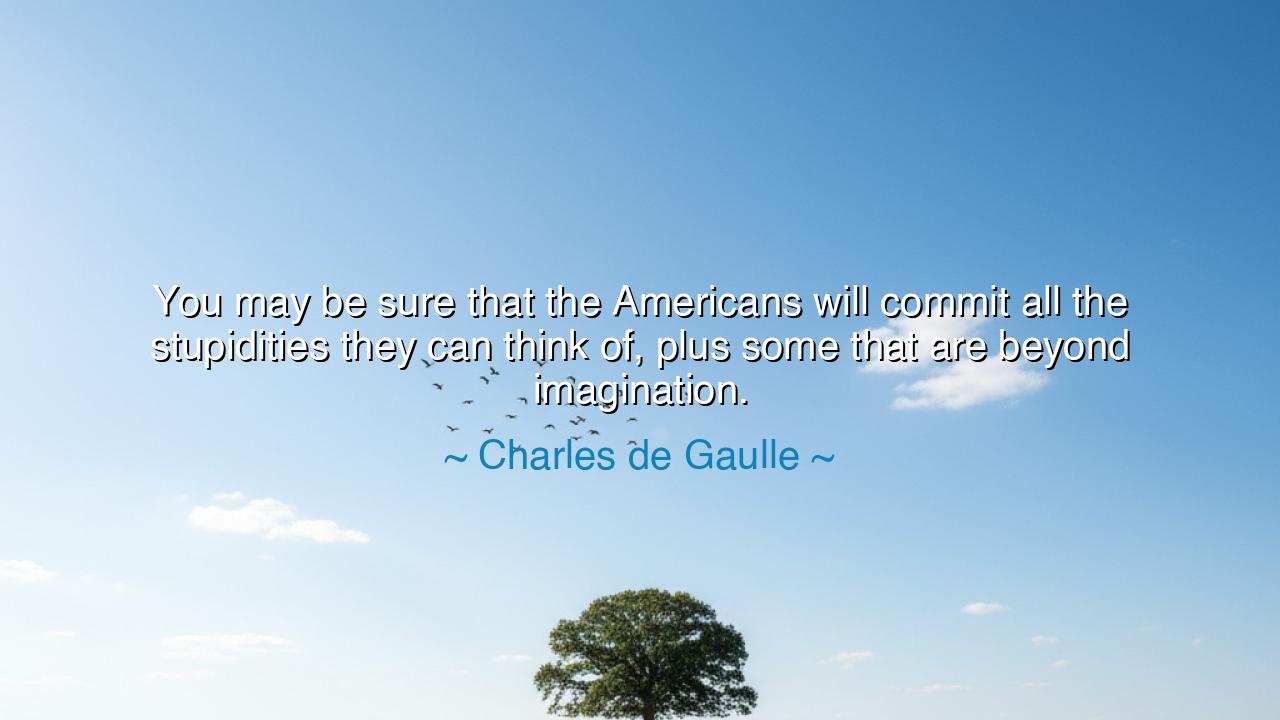
You may be sure that the Americans will commit all the
You may be sure that the Americans will commit all the stupidities they can think of, plus some that are beyond imagination.






“You may be sure that the Americans will commit all the stupidities they can think of, plus some that are beyond imagination.” Thus spoke Charles de Gaulle, the towering general and statesman of France — a man of irony, pride, and deep understanding of human nature. His words, though edged with wit, are not born of malice. They are the reflections of a leader who had seen the great power of nations entangled with their great folly. Beneath his jest lies a timeless truth: that in the pursuit of greatness, every people — not only Americans — are driven by imagination as much as reason, and in that same imagination lies both their triumph and their folly.
De Gaulle uttered these words in the turbulent age following the Second World War, when America had risen to unmatched power — victorious, ambitious, restless. He saw that the American spirit was boundless, daring, and inventive, yet often reckless. It sought to do much, to save, to build, to lead — but also to reshape the world according to its own vision. In their imagination, Americans dreamed of liberty and progress for all mankind. But that same imagination, untamed by humility, could lead them into stupidities beyond imagination — actions noble in intention yet disastrous in consequence. Thus, de Gaulle’s remark is both warning and praise, an acknowledgment of the immense energy that drives America, and of the danger that accompanies unrestrained power guided by conviction rather than reflection.
But the heart of his wisdom reaches beyond one nation. What de Gaulle spoke of America is true of all humankind. The greater the capacity for imagination, the greater the possibility for both creation and destruction. The same flame that lights the world can also consume it. When the Greeks built their shining cities, they also gave rise to hubris. When Rome conquered the known world, it sowed the seeds of its own decay. When the inventors of the modern age forged new tools for comfort and progress, they also created weapons capable of ending life itself. Humanity, in its striving, has always walked this line — between brilliance and folly, between creation and collapse.
Consider, for example, the story of the Vietnam War, a tragedy born in part from America’s boundless imagination of its moral mission. Believing itself the guardian of freedom, it entered a conflict that would divide its own soul. De Gaulle foresaw such outcomes — the danger of a people so certain of their purpose that they could not see the limits of their wisdom. Yet, in fairness, it is also this same imaginative audacity that built great bridges, conquered the moon, and gave the world art, science, and the dream of democracy. The American genius — like that of all bold peoples — is inseparable from its errors, for both spring from the same restless heart.
De Gaulle’s tone, though sardonic, is that of the philosopher rather than the cynic. He recognizes that stupidity is not mere ignorance — it is the inevitable shadow cast by human creativity. Those who dare to imagine what does not yet exist will sometimes fail spectacularly, for only those who risk the impossible can stumble beyond imagination. It is easy to mock the mistakes of the daring; it is harder to see that the same courage that births foolishness also births progress. The true danger, then, is not in stupidity itself, but in the failure to learn from it. The wise stumble, but they rise again with understanding. The fool repeats his fall, believing himself infallible.
From this, let every generation take heed: imagination is a sacred force, but it must be tempered with humility and guided by wisdom. To imagine without reflection is to invite chaos; to act without learning is to turn power into blindness. When a nation or an individual grows strong, they must guard themselves against the arrogance of certainty. For as de Gaulle implies, strength without introspection breeds folly — and imagination without conscience becomes madness.
So, dear listener, take this lesson into your own heart. Whatever power you hold — be it of mind, of wealth, or of will — use it not only to dream, but to discern. Let your imagination soar, but keep your reason close beside it. Dream greatly, but remember that even the grandest visions can birth errors if the soul forgets to listen. For though the world may laugh at the stupidities beyond imagination, it is those same leaps — when guided by wisdom — that build civilizations, heal the wounded, and lead humanity forward. Thus, the challenge is eternal: to dream as boldly as America, yet to learn as humbly as the wise.






AAdministratorAdministrator
Welcome, honored guests. Please leave a comment, we will respond soon